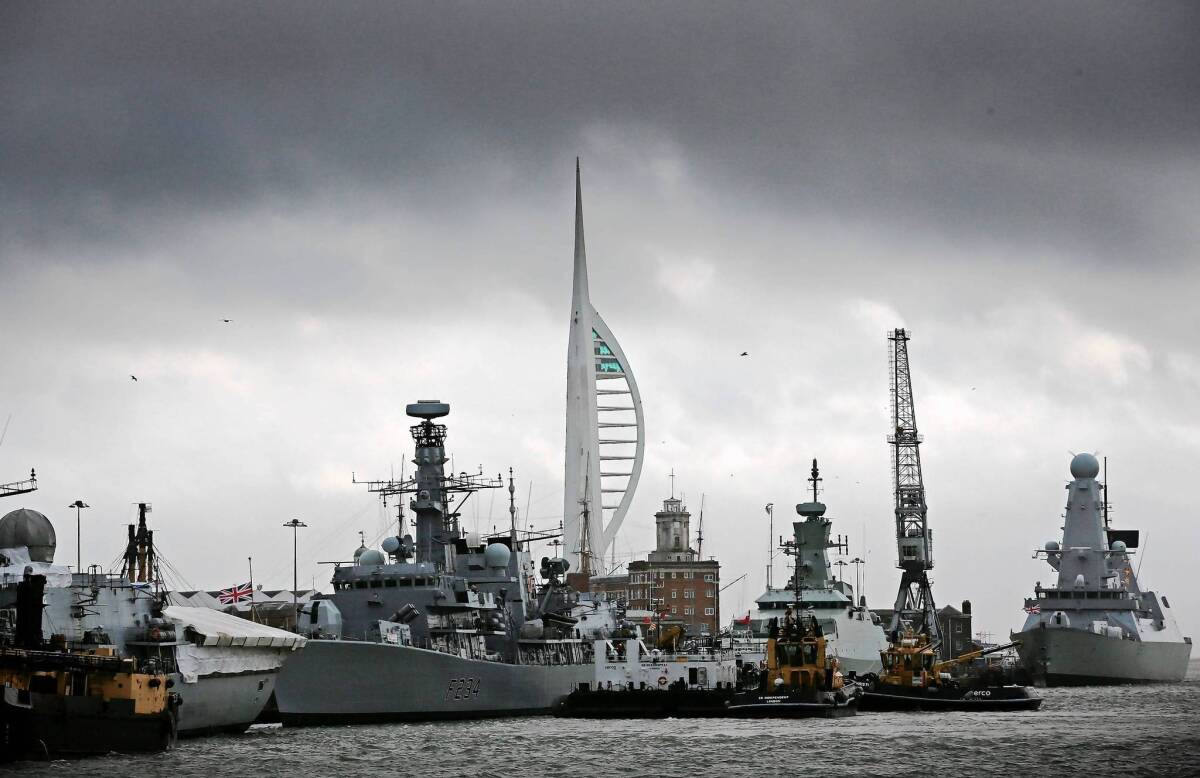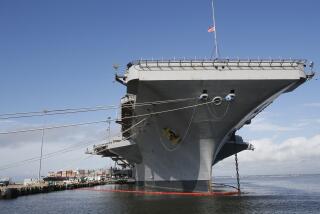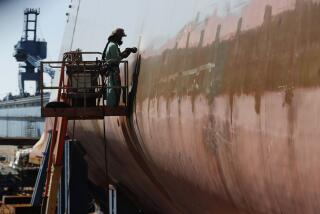Portsmouth, England, bemoans loss of shipbuilding identity

- Share via
PORTSMOUTH, England — Back when Britannia ruled the waves, few places contributed more to the domination and expansion of the British Empire than this seaside city.
Its dockyard, reputedly the world’s largest industrial site at the dawn of the 19th century, rang with the cries and hammer blows of thousands of workers who built the warships that flexed Britain’s muscles in almost every corner of the globe. Shipwrights here traced their connection to the navy to the reign of Henry VIII.
But that proud tradition is coming to an end, along with yet another chapter in the long book of British post-imperial downsizing. In 2014, Portsmouth is to cease building ships, losing 940 jobs. And for the first time in centuries, England will be without a big dockyard to churn out vessels for a once-invincible naval fleet.
Although many workers will continue to service and repair military ships, to think that Portsmouth will no longer make them pains a city whose identity has been so wrapped up in it.
“It’s just a very emotive thing to say that there will never be shipbuilding in Portsmouth ever again,” said Caroline Dinenage, a member of Parliament from the greater Portsmouth area and the granddaughter of a dockyard worker. “It’s a devastating rocket into the heart of the community … after 800 years of shipbuilding.”
Beyond sadness, the shutdown announcement last month has also sparked local anger and inflamed regional tension.
Under an agreement between the government and defense contractor BAE Systems, warship manufacture will be shifted wholly to dockyards in Scotland. Those sites are slated to shed workers as well, but about 100 fewer than in Portsmouth and over a longer period.
That has led to accusations of cynical maneuvering by politicians in London willing to sacrifice jobs in England for ones in Scotland, in order to appease voters north of the border ahead of a historic referendum in September on Scottish independence. It’s both carrot and stick, critics say: an inducement to Scots to remain part of Britain, and a warning that those jobs would be snatched back if Scotland opted to secede.
Gary Cook, a union representative, said workers here on the southern English coast feel betrayed.
“The struggle will continue,” he said. “We were making ships in Portsmouth hundreds of years before the Mayflower.”
In truth, though, the prospect of cuts to the dockyard workforce started to loom large in Portsmouth long before the possibility of a plebiscite on Scottish independence, as a simple matter of economics.
Britain is not the maritime colossus it was 125 years ago when its naval power was unrivaled, or even 25 years ago, when its dockyards still turned out three or four ships a year. Average annual production has dwindled to less than one.
The drop has been due largely to the inevitable shrinkage of the Royal Navy as pieces of empire fell out of Britain’s grasp. In recent years, deep cuts in government spending have further decreased the size and scope of the armed forces, and reduced demand for high-end military hardware.
Somewhat glossed over is the fact that its dockyard hasn’t built a full ship, with one exception, since the frigate Andromeda was launched in 1967. Construction then halted for more than 30 years until the building of the Clyde, a patrol craft launched in 2006. Since then, only parts of warships have been constructed here, including work currently underway on a new class of multibillion-dollar aircraft carriers.
“People who have lived in and around Portsmouth all their lives know that shipbuilding has always fluctuated,” Dinenage said. “They knew that the number of jobs would draw down considerably as the carrier project came to an end. Something like that only comes along once every 50 years.”
She and others note that, though nearly 1,000 jobs in shipbuilding are to be jettisoned, 11,000 people will still be employed to maintain vessels. Portsmouth will also still be home to one of Britain’s three main naval bases, host to a majority of the navy’s surface fleet.
Yet a future in which the city doesn’t add to that fleet, even in bits and pieces, strikes at the core of how it sees itself, as an indispensable center of an industry that helped turn a small island into a global conqueror.
Charles Dickens may be Portsmouth’s most famous native son, but pride in its naval heritage is in evidence from the waterfront pub decorated with crests of warships to the drafty old churches with tombstones paying tribute to officers who died on the high seas.
There’s been a naval presence of some sort here since 1194. The precursor to today’s navy began under Henry VIII, whose flagship, the Mary Rose, was raised from the seabed nearly 450 years after it was sunk during a battle with the French in 1545. It is now housed in a glittering museum that opened at the dockyard this year. The Victory, helmed by Adm. Horatio Nelson at the pivotal Battle of Trafalgar in 1805, is also moored here.
Shipbuilding in Portsmouth reached its zenith, along with the British Empire, in the Victorian and Edwardian eras, which saw construction of the mighty Dreadnoughts that stoked the arms race among European nations in the lead-up to World War I.
As much as Portsmouth helped build the navy, the navy helped build Portsmouth.
“It’s the expansion of the dockyard in the 19th century in particular, and the massive explosion in the workforce, that allows the [surrounding] villages to grow and grow and become modern Portsmouth,” said Duncan Redford, a historian at the National Museum of the Royal Navy. “The dockyard as a whole has been a very important employer for Portsmouth … for hundreds of years.”
To compensate for the loss of shipbuilding, the government plans to invest $160 million in ship-servicing work. But local officials warn that Prime Minister David Cameron is making a terrible — and potentially dangerous — mistake.
“If Scotland votes in 10 months’ time to become independent, the last yard in England with the ability to build advanced warships would have closed, and what remains of the United Kingdom would have no ability to build advanced warships,” said Gerald Vernon-Jackson, leader of the City Council.
“That means we either have to go to other countries to buy them,” he said. “Or we would have to re-create our own ability to build these ships in Portsmouth or wherever, at huge extra cost.”
Vernon-Jackson doesn’t want to see either British naval prowess or national security compromised. He has navy in his blood: An ancestor, Edward Vernon, led British ships to victory over Spain in 1739, a triumph that gave rise to the song “Rule, Britannia!” and its famously patriotic chorus.
“We’re an island nation, and 95% of our trade comes by seas. If the sea lanes aren’t safe, we can’t eat, and there’s no fuel in our cars, no gas for our heating,” Vernon-Jackson said. “It’s not in our long-term strategic interest to get this wrong.”
News assistant Janet Stobart in The Times’ London bureau contributed to this report.
More to Read
Sign up for Essential California
The most important California stories and recommendations in your inbox every morning.
You may occasionally receive promotional content from the Los Angeles Times.










